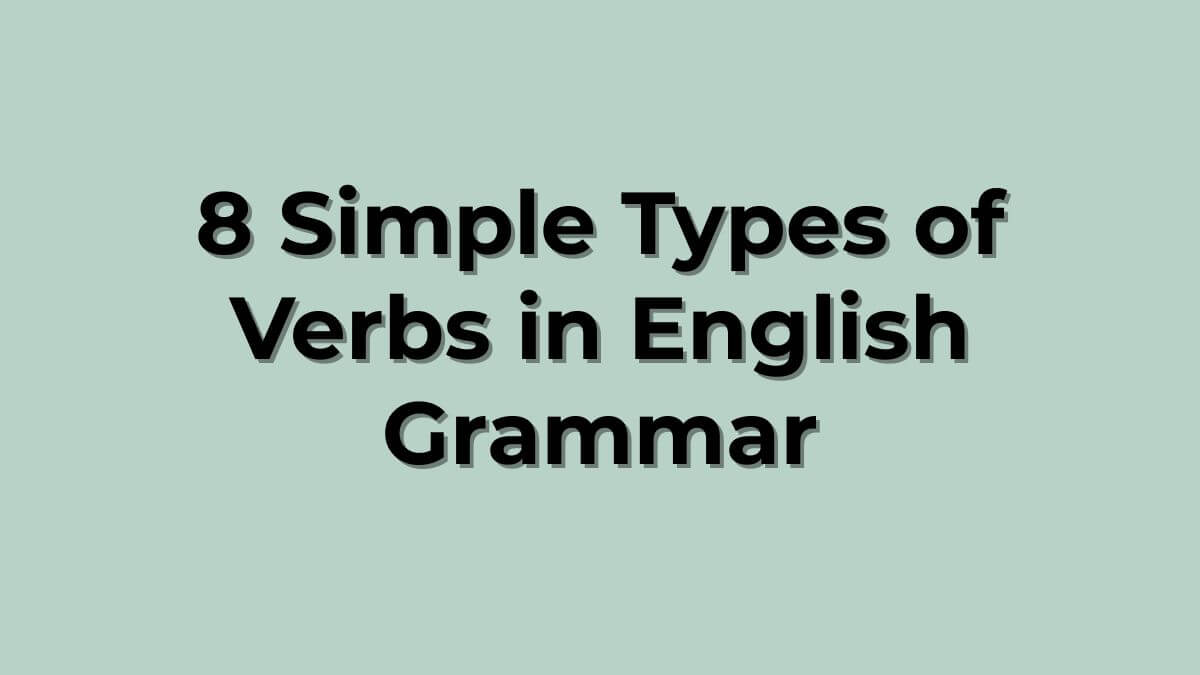Understanding the types of verbs in English grammar is a big step toward mastering the language. Whether you’re an ESL learner or a teacher guiding students, learning about the different verbs in English grammar can make communication clearer and more effective.
In this blog post, we’ll explore 8 simple types of verbs with 5 clear examples for each. Let’s dive in and strengthen your grammar skills with ease and confidence!
What Are Verbs?
Verbs are action words in a sentence. They explain what the main subject is engaged in and describe its current state. Simply put, verbs are the heart of every sentence.
1. Action Verbs
Action verbs show physical or mental actions. They are the most common and easiest to understand.
Examples:
- She runs every morning.
- He writes stories in his notebook.
- They play football after school.
- I think about my future often.
- We build strong friendships at work.
2. Linking Verbs
Linking verbs work like a mirror, reflecting the subject’s identity or condition instead of showing movement or activity.
Examples:
- She is a teacher.
- The soup tastes delicious.
- He feels tired today.
- The sky looks clear.
- They are happy with the results.
Read More:
- 500 Emotional Vocabulary List, Emotional Word List for English Learners
- Using Articles A, An, The – A Simple Guide to Learn Prepositions Better
3. Helping Verbs (Auxiliary Verbs)
Also known as auxiliary verbs, helping verbs combine with the main verb to form different grammatical aspects. Some popular ones are is, have, had, were, and shall.
Examples:
- She is reading a book.
- They have finished their homework.
- We will go to the market.
- I am learning English.
- He was playing guitar.
4. Transitive Verbs
When using a transitive verb, the subject does something to an object—the action doesn’t stand alone.
Examples:
- She bought a new dress.
- He ate the sandwich.
- I wrote a letter.
- They watch TV every evening.
- We play video games.
5. Intransitive Verbs
Intransitive verbs do not need a direct object. The action does not pass to an object.
Examples:
- She sleeps peacefully.
- They arrived late.
- He jumps high.
- We laughed loudly.
- I travel often.
6. Modal Verbs
This type of verb expresses necessity, ability, permission, or possibility. Examples of modal verbs are can, could, may, might, must, shall, should, will, and would, each expressing different meanings.
Examples:
- I can swim.
- She must study hard.
- You may leave now.
- They should be careful.
- He might come tomorrow.
7. Regular Verbs
Regular verbs follow a standard pattern. When dealing with regular verbs, simply attach -ed to the root verb to form the past tense and past participle.
Examples:
- I walked to school.
- She cleaned her room.
- They played basketball.
- We talked for hours.
- He opened the door.
8. Irregular Verbs
Irregular verbs do not follow the regular pattern when changing into past tense or past participle.
Examples:
- He went to the store. (go → went)
- They ate dinner early. (eat → ate)
- I saw a rainbow. (see → saw)
- She took a break. (take → took)
- We wrote a report. (write → wrote)
Why Understanding Types of Verbs Is Important
Learning about the various verb types in English grammar empowers you to:
- Use correct sentence structures
- Improve writing and speaking skills
- Understand English better in conversations and books
- Avoid grammar mistakes
Whether you are practicing basic communication or preparing for exams, mastering these verbs in English grammar is essential.
8 Simple Types of Verbs
| Verb Type | Description | Example |
| Action Verbs | Show physical or mental action | She runs daily. |
| Linking Verbs | Connect subject to a state/condition | He is tall. |
| Helping Verbs | Support main verb in a sentence | They are studying. |
| Transitive Verbs | Require a direct object | I read a book. |
| Intransitive Verbs | Do not need a direct object | She sleeps soundly. |
| Modal Verbs | Show possibility, ability, etc. | You can do it. |
| Regular Verbs | Follow regular tense patterns | He played well. |
| Irregular Verbs | Change form unpredictably | They ate lunch. |
Conclusion
Now that you’ve explored the 8 simple types of verbs with examples, you’re one step closer to mastering English grammar. From action verbs to irregular verbs, each plays a unique role in sentence formation. Understanding the types of verbs in English grammar helps you build stronger, more accurate sentences.
So the next time you read, write, or speak in English, remember these essential types of verbs and don’t forget to practice them daily!
